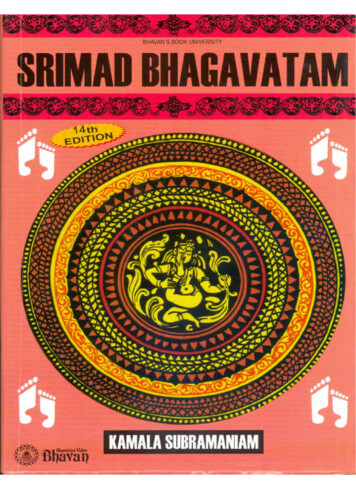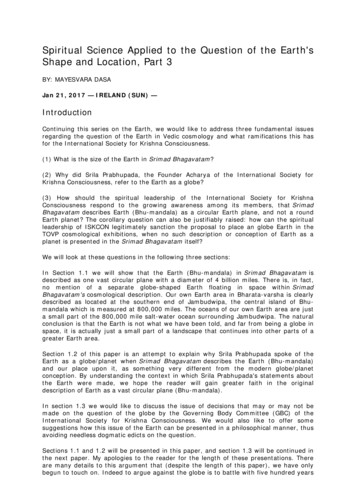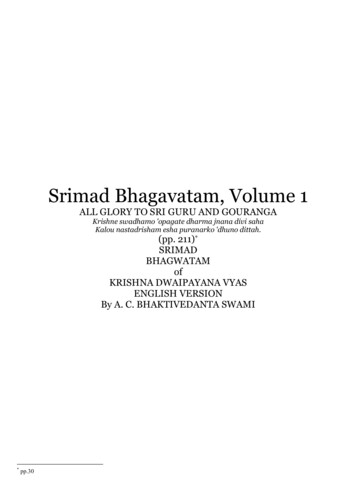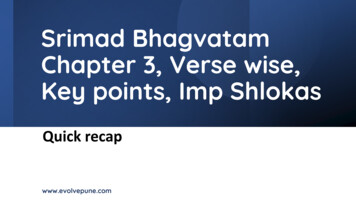
Transcription
SRIMAD BHAGAVATAMByKamala Subramaniam
All Rights ReservedBharatiya Vidya BhavanKulapati Munshi MargMumbai 400 0071st Print Edition: 19792nd Print Edition: 19813rd Print Edition: 19874th Print Edition: 19885th Print Edition: 19936th Print Edition: 19957th Print Edition: 19978th Print Edition: 20039th Print Edition: 200610th Print Edition: 200811th Print Edition: 201012th Print Edition: 201213th Print Edition: 201314th Print Edition: 2015Kindle Edition: 2016PRINTED IN INDIABharatiya Vidya Bhavan,Mumbai 7.
Let noble thoughts come to us from every side-Rigveda 1-89-i
SRIMAD BHAGAVATAMByKamala Subramaniam2016BHARATIYA VIDYA BHAVANKulapati K. M. Munshi Marg,Mumbai 400 007
FOREWORDThis is a summarised version of the Mahapurana Srimad Bhagavatamwritten by Smt. Kamala Subramaniam. Earlier Smt. Subramaniam hadbrought out a condensed version of the great epic Mahabharata also whichbecame very popular and was highly valued by the society at large.While summarising the Mahapurana, Smt. Subramaniam has omitted onlythe ornamentations and decorations, usual in all Sanskrit literature. She hasuncompromisingly kept intact the solid hard core of the Mahapurana. Notonly she has taken no liberty with the essentials of this sacred book, but infact has brought them out more prominently in a language which is assimple as it is appealing. The readers of this sacred book will thus derivegreat spiritual benefit not confined to the Hindu society alone but also tomankind outside the Hindu fold.While studying the Kathas - the stories of the great personalities and of theavataras and the parables - the reader as he reads the passages shouldamply digest them to know the true purport of the suggestions, the lessonsand the indications behind them. These are not just embellishments. Theyhave a deep meaning under the surface. Attentive study of these shallspiritually inspire the reader more than the Kathas themselves.It is not my desire not it is desirable to make any comments on the contentand object of this Mahapurana. Such an effort on my part shall deprive thereader from drinking the joyful nectar which the original text contains in anadequate measure. Let the reader read the summarised version and ifattracted also the unabridged Grantha, digest and reflect and drawinspiration therefrom to mould his life and achieve the spiritual bliss andtranquility which is the ultimate goal of all the pilgrims of life — the JeevanYatra.The story goes that even after composing the Mahabharata Vyasa was notcompletely happy. On relating his dissatisfaction to the sage Narada, Vyasawas told that his restlessness was due to the fact that while in Mahabharatahe fully propagated Karma Yoga, he neglected Bhakti Yoga and that he
should write something more in the glory of Narayana, which alone shallgive him the full mental tranquility. It was at this suggestion of the sageNarada that Vyasa compiled Srimad Bhagavatam.The general impression that Bhagavatam is purely a Purana of Bhakti Yogatherefore is not unnatural. But on proper appreciation of the Mahapurana,we shall discover that while Bhakti does dominate, Jnana and Karma havenot been neglected in Bhagavatam. To put it correctly the Mahapurana isthe Sangam — Confluence — the Triveni of the three streams of BhaktiYoga, Karma Yoga and Jnana Yoga. It is thus the Samanvya, theSamuchhya, of all the three paths.This Samanvya is beautifully brought out by the Lord in Gita, Chapter IV,Stanza 10, where he states:vita-raga-bhaya-krodha man-maya mam upasritahbahavo jnana-tapasa puta mad-bhavam agatah"A Karma yogin free from attachment, fear and anger, a Bhakta absorbed inMe, taking refuge in Me.' a Jnana yogin 'purified by the fire of knowledge'with these qualifications of Karma yoga, Bhakti yoga and Jnana yoga manyhave attained My Beings."As described in Gita so also in Srimad Bhagavatam this Samanvya finds aprominent place.May God bless the readers of this Mahapurana.My congratulations and Sadhu Vada to Smt. Kamala Subramaniam for thisPunyakarya - a virtuous and meritorious act.May God bless her.G.D. BIRLA
PREFACEAum Namo Bhagavate VasudevayaSome years back, I made an attempt to narrate the story of theMahabharata. I must say that I succeeded to an extent in my attempt andthe book was published under the aegis of Kulapati Shri K. M. Munshi.My thoughts were then turned towards Sri Bhagavatam. To many peoplethe Bhagavatam signifies only Krishnavatara. In several pravachanas Ihave heard, only the tenth canto has been dealt with in great detail and thetalk ends invariably with the wedding of Krishna with Rukmini and that isthe end of it.There are quite a few, however, who are familiar with the ten avataras ofthe Lord: Matsya being the first and Kalki, the last. But then, there aremany more avataras - descents - of Lord Narayana down to the earth duringthe three yugas. I was eager to tackle this great Purana and try to makeyoung minds familiar with it.Right from the beginning one fact was clear. Sri Bhagavatam is entirelydifferent from Mahabharata. There is continuity in the Mahabharata, in thestory, which makes the narration comparatively easy. On the other hand, theBhagavatam is made up of a number of isolated stories, incidents andinnumerable episodes. There is no continuity here to hold the attention ofthe reader.I was at a loss as to how I should begin. There are several places where onecan say: "This is the beginning." The Bhagavatam is repeated from mouthto mouth and it is related to different people by different preceptors. It is aconfusing, tantalising, labyrinth where one easily gets lost. And again, sinceBhakti is the central theme, there are numerous passages where the praisesof the Lord are sung. This is mostly by Brahma who, with the Devas, recitesthe Purushasukta. I was afraid that constant repetition would be unwelcomeand so I have condensed some of the prayers and omitted some othersaltogether. This was unavoidable.
The Bhagavata Purana is made up of ten sections. The first is called sarga.It comprises the creation of the universe, the mahat and aham tattvas, andthe tanmatras. The manifestation of the Virat Purusha; the creation ofliving and non-living beings by Brahma, Hiranyagarbha, is called visarga.The establishment of each created being in its proper place by the Lord iscalled utkarsha. His Grace which is infinite towards his Bhaktas and whichprotects them goes by the name poshana. The narration of the differentperiods of time started by different Manus is manvantara. The vasanasfollowing the karmas performed in the previous janma are called oothi. Thestories about the Lord and his avataras are collectively named ishakatha.The merging of the jivatma with the paramatma after the yoganidra iscalled nirodha and the casting away of the objects of enjoyment and eventhe desire for them which is naturally followed by atman becoming onewith the Brahma is called mukti. Aabhasa which is creation and nirodhawhich is the merging back at the end of Time are all caused by the ONEwhich is Eternal: which has no beginning and no end and which cannot bedescribed by words: that is called aashraya. He is the refuge of everythingin the Universe. The aim of every aspirant is to reach this aashraya andbecome one with Him. This is the purpose of all tapas, of all yogas andTHAT is the one Truth to be realised.I have enumerated the many sections of the Bhagavata Purana in suchdetail to make the reader understand how complex it is and I hope I will beforgiven when I say that I found it almost impossible to handle all of it.I decided to take up one of these sections: Ishakatha, touching on the othershere and there. The story of Creation has been related in different placesand in different forms. The foremost of them is when Brahma relates it toNarada. Lord Narayana Himself had explained it to Brahma and that is thefirst version of visarga. Another is when Maitreya learns it from Parasara.Originally Adishesha or Ananta is said to have taught this to Sanatkumara.Sankhyayana learnt it from Sanatkumara and taught this to Brihaspati.Brihaspati passed it on to Parasara from whom Maitreya learnt it and, in histurn, taught this to Vidura.Considering the complexity of the Purana, and again, considering the factthat the reader is expected to be already familiar with the many words and
terminologies used in the visarga, it seemed to me that it may not be easy tofollow it at first reading. I have, therefore, related the same in Chapters 279to 293. It is all quite complicated and I cannot claim that I have been able todo full justice to the grandeur and sublimity of the subject.I have tried to begin at the very beginning and find my way through theconfusing, distracting and, at the same time, fascinating wilderness calledBhagavatam.Barring the Purushasukta which occurs again and again throughout thePurana like the refrain of a song or like the hypnotic drone of the tanpura ina musical concert, I must draw the reader's attention to some beautifulstotras. The first of them is the adoration of Krishna by Kunti where shesays: Vipadah Santunah Shashvatah—May misfortunate visit uscontinuously.There is the worship of Narayana by the child Dhruva and later, the wordsspoken by the other child Prahlada in praise of the Lord in the form ofNarasimha.One of the most beautiful passages in the Purana is the long conversationbetween Krishna and Uddhava at almost the end of the book. Part of it I hadto place in the end since it seemed likely to tire the reader at the firstreading. This conversation is almost a re-casting of the Bhagavad Gita.However, I have taken special care not to condense the Avadhuta Gitawhich is sublime. As for the tenth canto which deals entirely with Krishna'schildhood I have not omitted anything. It is not possible to be anything butemotional when one goes through this particular canto. As for the esotericsignificance of several controversial incidents in the tenth canto, I have notventured into that field. My work has been just the narration of theincidents.Kapila Vasudeva's teachings to his mother Devahuti are in the main book.But the Sankhya on which Kapila has elaborated has been placed in the endsince it is quite tough. I have tried to elucidate it but I do not know how farI have been successful in the attempt.
The glossary has been complied with great care. It has become quitevoluminous but it is essential that the meanings of the words should begiven or else, for those not quite familiar with the phraseology of thePurana, it will not be very easy to follow the narrative.In spite of these many shortcomings the book may, I hope, be accepted bythe discerning readers who will be tolerant enough to overlook the lapses.It goes without saying that this is not a literal translation but an attempt torelate the story of the Lord, of Narayana, and the many forms he donned toestablish Dharma on the earth. Twenty-six is the number of which Kalki isyet to happen. Krishnavatara is the Poornavatara and to lead the thoughtsof the readers towards these many appearances of the Lord has been mydesire and if the youngsters who read this book become interested enoughin the Purana to try and read it in the original, my purpose will be served.I owe a deep debt of gratitude to Shri Ghanshyamdas Birla for the interesthe has taken in the book and for the Foreword he has been kind enough towrite for it.KAMALA SUBRAMANIAM
DPREFACENAIMISHARANYATHE COMING OF NARADATHE PREVIOUS BIRTH OF NARADATHE SEARCH AFTER TRUTHTHE END - WHICH WAS THE BEGINNINGUTTARAYANATHE SON OF ABHIMANYUKRISHNA TAKES LEAVE OF KUNTIYUDHISHTIRA PERFORMS ASHVAMEDHAVIDHURA LAYS DOWN HIS BOWVIDHURA'S RETURN AFTER THE WARTHE END OF DHRITARASHTRANARADA'S VISIT TO HASTINAARJUNA COMES BACK FROM DWARAKATHE COW AND THE LAME BULLTHE HAUNTS OF KALISHRINGI'S CURSEON THE BANKS OF SACRED GANGADHARANATHE TRAGEDY AT PRABHASAIN THE BEGINNINGADI VARAHADITI, DAKSHA'S DAUGHTERTHE ARROGANT DOOR-KEEPERSTHE KILLING OF HIRANYAKSHAKARDAMA'S PENANCETHE COMING OF DEVAHUTITHE IDEAL WIFEKAPILA'S VASUDEVA
3.64.65.KAPILA AND HIS TEACHINGSKAPILA'S TEACHINGS IITHE END OF THE DEVAHUTIYAGNYA, THE SON OF AKUTIDATTATRAYADAKSHA'S ANGERCONFLICT IN KAILASSATI KILLS HERSELFTHE ANGER OF A GODA GOD'S FORGIVENESSA CHILD'S RESOLVEDHRUVA'S TAPASTHE CONSTANT STARTHE BIRTH OF VENATHE RULE OF VENAPRITHU, THE GREATPRITHU'S ANGERTHE MILKING OF MOTHER EARTHNINETY-NINE ASHVAMEDHASKING PRACHINABARHISTHE STORY OF PURANJANATHE HAPPY LIFE OF PURANJANAAVIGNYATA COMES BACKTHE TRUTH UNDERLYING THE STORYTHE ROAD TO FREEDOMTHE PRACHETASA BROTHERSPRIYAVRATAPRIYAVRATA'S RULETHE BIRTH OF RISHABHATHE TEACHINGS OF RISHABHABHARATA, THE HERMITBHARATA, THE DEERJADA BHARATABHARATA, THE PALANQUIN-BEARERBHARATA TEACHES BRAHMA VIDYAAJAMILA'S DEATH
66.YAMA EXPLAINS67.DAKSHA'S DESCENDANTS68.THE BIRTH OF VRITRASURA69.INDRA GETS HIS VAJRA70.COMBAT BETWEEN INDRA AND VRITRA71.THE KILLING OF VRITRA72.BRAHMAHATYA PAPA73.KING CHITRAKETU74.THE DEATH OF THE PRINCE75.BRAHMA VIDYA76.THE CURSE OF SATI77.THE BIRTH OF THE MARUTS78.YUDHISHTIRA'S DOUBT79.HIRANYAKASHIPU80.HIRANYAKASHIPU IS GRANTED A BOON81.PRAHLADA, THE SON OF HIRANYA82.THE LESSONS WHICH PRAHLADA LEARNT83.HOW HE KNEW ABOUT NARAYANA84.THE FINAL ENCOUNTER85.NARASIMHA86.PRAHLADA'S PRAYER87.THE ELEPHANT AND THE CROCODILE88.LIBERATION89.AMRITA MANTHANA90.THE CHURNING OF THE OCEAN - KURMA AVATARA91.KALAKUTA92.THE BIRTH OF LAKSHMI93.AMRITA, AT LAST94.THE WAR RESUMED95.BALI THE POWERFUL96.THE BIRTH OF VAMANA97.BALI'S YAJNA98."DO NOT GIVE", SAYS SHUKRA99."THREE PACES OF GROUND"100. BALI KEEPS HIS PROMISE101. MATSYA AVATARA
DEYA, THE BHARGAVATHE VISION SEEN BY MARKANDEYASUKANYANAABHAAKAAMBARISHAKAKUTSTHA AND OTHERSSAGARA AND HIS SONSAMSHUMANGANGA-BHAGIRATHIKING SAUDASASRI RAMATHE CHANDRA VAMSAPURURAVASPARASURAMAKARTAVIRYA, THE HEHAYAVASISHTHA HOSTS THE KINGA FRUSTRATED KINGKAUSHIKA'S TAPASKING TRISHANKU OF THE SOLAR RACETRISHANKU SVARGASHUNAHSHEPAKAUSHIKA'S LAPSEVISHVAMITRA, THE BRAHMARSHINAHUSHATHE QUARRELA KING TO THE RESCUEDEVAYANI'S REVENGEYAYATI WEDS DEVAYANISHARMISHTHADEVAYANI'S ANGER AND SHUKRA'S CURSETHE SONS OF YAYATIDISSATISFACTIONDUSHYANTASHAKUNTALATHE KING WEDS SHANKUNTALAHER CONFESSION
NTALA WAITS IN VAINTHE LEAVE-TAKINGMOTHER AND SONDUSHYANTA - THE KINGTHE PENITENT KINGRANTIDEVAGANGA AND THE VASUSTHE YADAVA LINEADHARMA IS RAMPANTA VOICE FROM THE HEAVENSSHANKARSHANATHE BIRTH OF KRISHNAKRISHNA IS TAKEN TO GOKULAVISHNUMAYAKAMSA'S CAMPAIGNSHEAVEN ON EARTHPUTANASHAKATASURA AND TRINAVARTATHE NAMING OF THE CHILDRENKRISHNA'S PRANKSYASHODA SEES A VISIONYASHODA TIES UP KRISHNATHE TWIN TRESS IN THE COURTYARDKRISHNA, THE LIFE AND SOUL OF GOKULAA HANDFUL OF ARANYAKA FRUITSFROM GOKULA TO BRINDAVANVATSA AND BAKAAGHASURABRAHMA'S DOUBTTHE MASQUERADE FOR A YEARBRAHMA'S CHAGRINBALARAMA KILLS DHENUKATHE POISONED LAKEKALIYAKALIYA SUBDUEDTHE FEUD IN RAMANAKA
BHATHE FOREST FIRETHE RAINY SEASONSHARAD RITUTHE MAGIC OF KRISHNA'S FLUTEKRISHNA'S PROMISE TO THE GOPISTHE DEVOTION OF THE YAJNA-PATNISTHE REPENTANCE OF THE BRAHMINSNOT INDRA, BUT GOVARDHANA!INDRA'S ANGERKRISHNA IS CROWNED AS GOVINDANANDA RESCUED FROM VARUNAON A MOONLIGHT NIGHTKRISHNA AND THE GOPISTHE SEARCH FOR THEIR LOST LOVEDISCOURSE ON LOVERASA KRIDASUDARSHANA, THE VIDYADHARAARISHTA'S DEATHONCE AGAIN NARADA VISITS KAMSAKAMSA SENDS FOR AKRURAKESHI IS KILLEDSAGE NARADA VISITS KRISHNAVYOMA, THE LAST OF THE ASURASAKRURA ARRIVES IN BRINDAVANAKRURA, THE CRUEL!AKRURA SEES A VISIONIN THE STREETS OF MATHURATRIVAKRATHE GREAT BOW IS BROKENTHE KILLING OF KUVALAYAPIDATHE KILLING OF KAMSAAT LAST, AT LONG LASTTHE ASHRAMA OF SANDIPANIUDDHAVA SENT TO BRINDAVANUDDHAVA COMFORTS THE GOPIS
235.236.237.238.239.240.241.242.243.244.245.AKRURA SENT TO HASTINAHASTINA, THE FAMED CITYA PIECE OF ADVICEJARASANDHA: THE SIEGE OF MATHURAKALAYAVANATHE KING MUCHUKUNDAMOKSHA FOR MUCHUKUNDAJARASANDHA IS DECEIVEDKALAYAVANA'S STORYRUKMINI, THE PRINCESS OF VIDARBHARUKMINI SENDS A MESSENGERDWARAKA, THE ROSE-RED CITYRUKMINI'S MESSAGERUKMINI'S DESPAIRTHE PRINCESS WALKS TO THE TEMPLERUKMINI FRUSTRATEDPRADYUMNAMAYAVATIKRISHNA MUST HAVE STOLEN ITTHE BEAR'S CAVETHE VINDICATIONTHE KILLING OF SATRAJITSHATADHANVAAKRURA'S BOUNTYDRAUPADI'S SWAYAMVARAKALINDI, MITRAVINDA AND SATYABHADRA AND LAKSHMANANARAKASURABANASURA, THE SON OF BALIUSHA'S DREAMTHE ATTACH ON BANA'S CITYNRUKA, THE SON OF IKSHVAKUBALARAMA'S ANGERPAUNDRAKA VAASUDEVABALARAMA KILLS DVIVIDHALAKSHANA, DURYODHANA'S DAUGHTER
271.272.273.274.275.276.277.278.279.280.281.TWO REQUESTS TO KRISHNADISCUSSIONSJARASANDHA, THE POWERFULJARASANDHA FIGHTS A DUELTHE RAJASUYA YAGASHISHUPALA OF CHEDISALVA ATTACKS DWARAKAKRISHNA ON THE BATTLEFIELDKRISHNA AND SUDHAMADO YOU REMEMBER?A HANDFUL OF RICEA VISION OF THE FUTUREAN ECHO FROM THE PASTTHE HOMEGA OF THE RISHISDEVAKI'S DESIRESUBHADRAHARANASHRUTADEVA AND BAHULASHVATHE DOUBT OF PARIKSHITTHE STORY OF VRIKATHE BEST AMONG THE THREEARJUNA'S OATHTHE CURSE OF THE RISHISTHE GREAT WARBALARAMA'S TIRTHA YATRATHE VISIT OF THE DEVASKRISHNA AND UDDHAVAAVADHUTA GITA - IAVADHUTA GITA - IIAVADHUTA GITA - IIITHE END OF THE YADU HOUSETHE FINAL HOURTHE AFTERMATHTHE END OF PARIKSHITUDDHAVA'S GRIEFTHE REQUISITESTHE FREE MAN
AKTI - A DEFINITIONKARMA YOGA AND BHAKTI YOGAHAMSA AVATARABHAKTI - AGAINTHE VIBHUTIS OF THE LORDTHE DIFFERENT PATHWAYSTHE THREE PATHSTHE BEGINNING - CREATIONBHAKTI-YOGA - AGAIN AND AGAIN.SANKHYATHE FIRST AVATARA-PURUSHATHE VIRAT PURUSHA AS DESCRIBED BY THE VEDASPHALASHRUTIGLOSSARYABOUT THE AUTHORTHE FRONT COVER
1NAIMISHARANYAHe was walking fast towards the southern slopes of the Himavan. He wasalone. He scanned the distance and discerned the thin spiral of smokesnaking its way to the skies. The spot was not far away. His footsteps werenow faster and soon he arrived at a cluster of thatched roofs. He had arrivedat Naimisharanya. When they saw him a number of rishis stood up andwelcomed him gladly. They offered arghya and padya. Making sure that hewas feeling fresh after his long trek they spoke to him in humble tones.Shaunaka, the leader of the group stood with folded palms and said: "Ourhermitage is honoured by the visit of the great Ugrashrava, the son ofRomaharshana. Vyasa was your father's guru and from that great seer;Vyasa, your father has learnt all the Puranas. As for you, you are famed asthe Sutapauranika and we are all eager to sit at your feet and listen to themany stories which you know so well. Please recount all of them to us."Suta smiled at them and said: "I heard that you were set on performing theBrahma satra, a yagnya which should last for a thousand years. Dvapara,the third quarter of Time has passed and Kali has set in. With the advent ofKali the earth has become the home of Adharma, of untruth, of injustice andall the many sins which are the attendants of Kali. This holy spot, I know,cannot be touched by Kali and I came here. Tell me what I can do for youand I will do my best to please you.""It is the state of the earth, ridden with Kali, that has made us dread thefuture", said Shaunaka. "Man is no longer assured of his hundred years oflife. Diseases rob him of his youth and his death is premature. His physicalwell-being is threatened by many ills: his mind is clouded by Kama,Krodha, Lobha, Moha, Mada and Matsarya, the six arch enemies of man.These in their turn, are attended by smaller evils. Man's intellect is cloudedby ignorance. If he has to emerge out of this illusion called Maya, if he hasto save his soul from this sinful life on earth, he will have to study theDharma Shashtras, the Purana the Vedas. But the man of today has neitherthe time nor the inclination to study what is good for him. Please, therefore,
let us know about a single Kavssya, a single great work, a single poemstudying which man can become pure and good and be freed from thebondage of Karma."Krishna, the incarnation of Lord Narayana, was on the earth duringDvapara. He left us and went away: and with him went Dharma -righteousness. People are groping in the darkness called ignorance. It is upto you, my lord, to tell us where Dharma has found refuge after thedisappearance of Krishna."Ugrashraya was pleased with their question. He smiled at them and said: "Iwill tell you where righteousness has found refuge after Krishna left theearth. The Sun has risen: the Sun which will dispel the inner darkness in themind of man during this sinful Kali Yuga. That Sun is the great BhagavataPurana composed by the seer Veda Vyasa. The Bhagavata tells you thestory of the Lord and the many avataras he took to establish Dharma on theearth. He is the infinite, the incomprehensible, not bound by anything: notby the chain of cause and effect which makes the ordinary man live throughjanma after janma in an endless cycle. He is beyond all this. But man is notgood enough or great enough to realise Him. He can see only throughhuman eyes, perceive only through the senses and grasp things only throughthe human intellect. We approach Him with the eyes of man born ofwoman. We ascribe to Him qualities which we have, and try to gauge Himby our standards. Knowing all this, the Lord, in His infinite kindness has, inthe past, assumed forms of living beings so that we could see Him. Throughthese descents into the world of men the Lord has helped man again andagain. He has established Dharma whenever there was threat of its beingeclipsed."Contemplating on the Absolute will not be possible for man today, riddenas he is by besetting sins. But even the worst sinner can be saved if helistens to the stories of the Lord, his many avataras. The Bhagavata is justthat. The path to the Lord is devotion, the Bhakti marga. It is Bhakti whichwe see as the golden thread running through all the avataras. TheBhagavata is string of beads which, like a japamala, helps you to realise theLord and reach Him. Vyasa composed this Puranas as his last contributionfor the good of the world. I will tell you how it came about."
2THE COMING OF NARADAThe river Saraswati was flowing placidly. On the banks of the river was theashrama of Vyasa. It was evening time and he was sitting on the sandsgazing at the ripples in the river with unseeing eyes. His eyes were sad andhis face, troubled. Some deep pain was mirrored in his thoughtful eyes: andso he sat for a long time.The silence around him was broken by the twanging of the strings of theVina. Sweet notes fell on his ears. With the music of the Vina was heard avoice singing the praise of Narayana. Vyasa looked up with an eager faceand found the young sage Narada coming towards him. Vyasa got up in aflurry, welcomed the divine rishi and made him take a seat of honour. Hethen sat at his feet: at the feet of the young rishi who was a son of Brahma.Narada smiled at Vyasa and said: "I hope all is well with you. I hope thatsickness and disease do not bother you. I am confident that your mind, clearlike a pond, is without agitations. You ought to be happy since you havecomposed the great poem, the Mahabharata which is a storehouse ofknowledge, of all the rules of conduct. It is indeed, a great achievement andthe world of men will benefit by your work. As for you, learned as you arein the Brahma Vidya, you must be without any sorrow." He paused for awhile and Vyasa sat silent without uttering a word. Narada spoke again. Hesaid: "It seems to me as though you are not looking happy. You seem to melike one who has not achieved what he wanted to. You have done so muchand yet to you, I think, it seems to be inadequate. What is worrying you?What makes you unhappy? "What you say is perfectly true", said Vyasa."And you are the only person who can clear my doubts. You are wise. Youare the son of Brahma. You are ever lost in praising the glories of LordNarayana and it seems to me, there is nothing which is beyond yourintellect. You are like the Sun which sees all the three worlds. With thepower of your Yoga you can, like the air, enter into human beings and knowwhat is hidden in their minds. You must be knowing the reason why I amdespondent.
"Long ago, I was once absorbed in meditation. In my mind's eye I saw thefuture of the world. I saw the deterioration of Dharma. I saw the nature ofMan undergoing a change for the worse. I saw that advent of Kali, of thesinfulness pervading the earth. I saw the gradual withdrawal of the glorythat had been her heritage all these years. And, I was filled with infinite pityfor the generations of men that are to be born in the Kali Yuga. I thereforeresolved to help them in their distress. I edited the Vedas. I divided it intofour parts and these four were taught to my disciples. Paila learnt the Riksand Jaimini, the Sama. Vaishampayana was the only one who could masterthe Yajur Veda. Sumantu became proficient in Atharva Veda. ToRomaharshana I taught the seventeen Puranas and the Itihasas. Thesedisciples of mine have divided the Vedas further and they have taught themto their disciples and they, in their turn, to theirs."I found that I had not done enough. I realised that those who cannot studythe Vedas, those who are not allowed to do so, should also be saved. And soI composed the poem by name Mahabharata wherein all the lessons of theVedas are taught in the course of the narration of the story. I had hoped thathumanity will benefit by all this."And yet, my friend, I feel that my work does not grant me satisfaction. Or,rather, I have not the peace, the state of tranquillity that should be mine byright if I have done the right thing. Tell me what I have left undone. What isit that will grant me peace? Please tell me. I am sorely distressed by thisunrest inside me".With a slight smile lighting up his young face Narada said: "I know thereason. You have not done enough.""Not done enough?" echoed Vyasa with dismay. "I have tried to do all that Ipossibly could. I have set down all that I thought was essential for the wellbeing of man and for his walking in the path of Dharma. What else is left?Tell me.""I still maintain that you have not done enough", continued Narada. "Thereis still something you have to achieve before you attain peace. You havedone a great service to humanity by composing the Mahabharata. There isno doubt about it. But there is one drawback in that great work."
Vyasa was listening to him as a student would, to the words of his guru. Adrawback in the Mahabharata? He was eager to know what it was. He didnot speak a word but his eyes were questioning as if to say: "Please tell me.Go on and tell me what the drawback is and how I can rectify it. I am eagerand impatient to know."Narada said: "You were interested in the welfare of the world and byrelating the story of the Pandavas you have taught the lesson thatrighteousness will conquer in the end: and where Krishna is, there is foundDharma. This is the lesson and there is no doubt that people will learn it.But you have, throughout the epic, laid stress on the duties of man: on hisDharma; on his performing them selflessly. The Bhagavad Gita and all theother discourses on Dharma lay stress on Karma Yoga, as you call it. But,my friend, you have not sung the praises of the Lord as much as you oughtto have. Know you not that the easiest path to the Lord is the path ofBhakti? All the other yogas are harder paths which lead to the feet of theLord."The praises of Narayana even if they are couched in wrong words, even ifthey are sung all out of tune, will assure man of the Grace of the Lord. Likea piece of Arni, which, when churned, will give forth smoke first and laterfire which will consume the wood itself, even so, the mind of man, whenchurned by constant devotion to the Lord, will make all the evil in himcome out on to the surface. The true Satvic nature of man will then blazeforth and, like fire, will consume the bondage of Karma and grant himsalvation for ever and ever."The Mahabharata was, to you, a play. Your attitude was purely objective.You entered into everyone of the characters. You were, therefore, thinkinggood thoughts as well as evil ones while in the process of portraying them.Incidentally the Lord was praised. There was no single-mindedness aboutyour devotion to Him. You must try to make up for this omission. Sing thepraises of Narayana. Relate to the world his Vishvarupa, His Viratarupa,His Vibhutis, His avataras and this, I assure you, will grant you the peaceyou are seeking. Unveil to the world the secret behind the avataras.
"Tell them why the Lord Who is beyond the opposites, Who has His abodein Ananta, Who is the Purusha, the life-giver to this entire Universe: whyHe should take a form and a name and a birth and become like one of us:why He should appear to be infused with one or the other of the three gunasand act as though He were a human being with human emotions. Praiseevery avatara of the Lord. Let nothing come from your lips except words ofpraise describing the glory of Narayana and you will find peace."Drive home to the world of men this lesson: even if a man fails in hisduties, duties which are ascribed to him by the Vedas and by the elders;even if he is a sinner who has
This is a summarised version of the Mahapurana Srimad Bhagavatam written by Smt. Kamala Subramaniam. Earlier Smt. Subramaniam had brought out a condensed version of the great epic Mahabharata also which became very popular and was highly valued by the society at lar ge. While summarising the Mahapurana, Smt. Subramaniam has omitted only .










